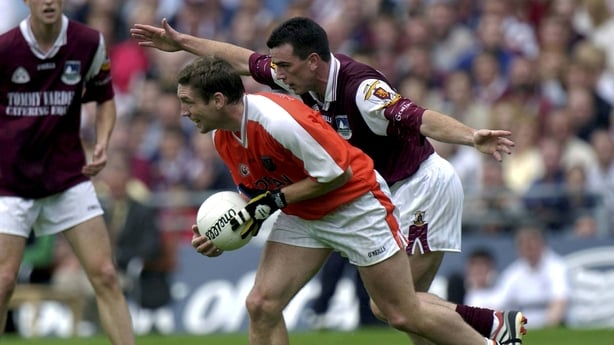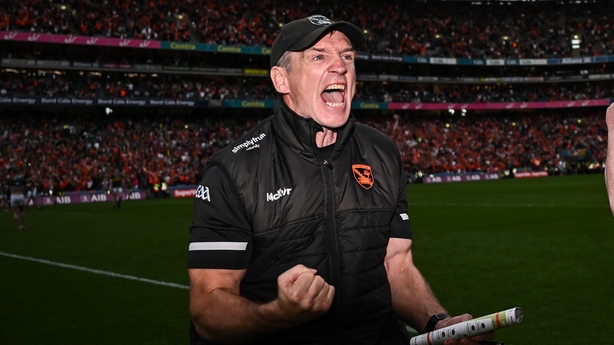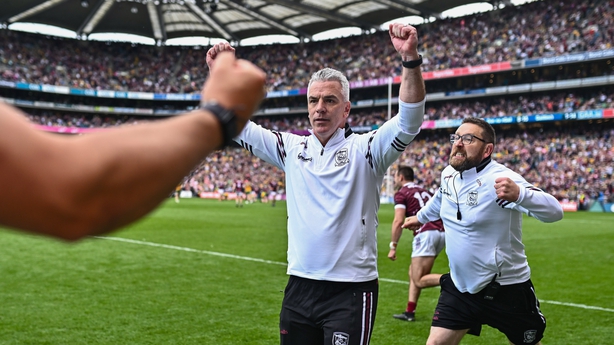Today's All-Ireland final between Galway and Armagh represents a welcome throwback to the early noughties, an era especially beloved of Gaelic football fans.
The year between Galway's last All-Ireland win in 2001 and Armagh's first and only title the following year was taken to mark the transition from one era to another.
The former, the first won under the new backdoor system and also via the back door, felt, in retrospect, like the last All-Ireland final of the 1990s, a notion certainly strengthened by the fact that Meath entered the game as favourites.
The latter heralded a resurgence of Ulster football after a period of lull in the late nineties, though it was Tyrone who subsequently became more synonymous with that revolution - and its chief bogeymen in the eyes of the southern aristocracy.
Few anticipated the pair would pitch up in an All-Ireland final at the beginning of the championship, or even midway through the championship.
Except the Galway manager, that is. In the wake of their drawn group game in Markievicz Park in June, when the westerners had tossed away a seemingly unassailable advantage in the second half, Padraic Joyce texted Kieran McGeeney a message along the lines of "See ye in the final." There were no South African rugby players around to take offence, in this instance.
"He actually predicted two or three things that have all come true," McGeeney said at last week's Armagh press evening, after recounting the contents of the text message. "I have asked him who did he see winning the final, but he hasn't told me that yet."

Both managers, perhaps the two men most associated in the public mind with their counties' last All-Ireland victories, endured a few difficult early years, when their capability to do the job was questioned internally.
McGeeney, in particular, has been a regular punchbag over his long years in the hotseat.
After a tumultuous few years in Kildare, he arrived into the Armagh setup in time to assist in their unexpected run to the 2014 quarter-final - inevitably stepping up to numero uno the following year.
It was a particularly inopportune time. Ciaran McKeever recounted this week how, through one thing and another, they were hit with a wave of retirements and opt-outs over that winter, players who were gone and wouldn't be back.
He was in his fifth campaign before they won an Ulster championship match. As late as his eighth season in charge, he still only had three Ulster SFC wins under his belt and no provincial final appearance.
Armagh's only All-Ireland winning captain laboured under the weight of what he regarded as delusional expectations in the county in the early years.
"We were playing in Division 3 and people were talking about All-Irelands," he recalled in a wide-ranging interview with Peter Canavan. "And I'm going, 'from what planet, like'."
In latter years, they progressed from mid-ranked outfit to championship nearly men, though McGeeney remained maligned in many circles.
His critics cited penalty shootout defeats as evidence that he had the mark of misfortune upon him, often roping in his inability to win championship silverware with Kildare, ignoring the context that Kildare have won two Leinster titles in 65 years, both under the same manager. Whatever about a good general, he certainly wasn't a lucky one.
It was suggested in some nebulous way by the more high-falutin of his critics that McGeeney's bearing, his highly-strung persona on the sideline, a perceived instinct towards overly zealous defensive-minded conservatism in clutch moments, was in fact part of the problem.
McGeeney himself was baffled by the narrative, especially given that Armagh had been, if anything, wildly cavalier in 2021 and 2022. Their 4-17 to 2-21 defeat to Monaghan in the 2021 Ulster semi-final didn't exactly scream defensive dourness. In his round of freewheeling press interviews last week, the Armagh boss bluntly admitted that his team had tried to play every which way at various points over the past decade.
Last year's penalty shootout loss to Monaghan saw an outburst of disquiet with 'Geezer Out' road signs sprouting up in recalcitrant pockets of the county and making their way around Whatsapp. There followed an attempted putsch from some clubs in the autumn, which the manager saw off easily, with the players a vocal element in his corner.

McGeeney, cheerfully forthcoming in all his recent interviews, rejects the notion that the failed attempt to depose him cost him any sleep and he's unlikely to face any challenge this year.
Guiding Armagh to a first All-Ireland final in over two decades, and only a fifth in their history, will not have the manager's most dedicated critics throwing garlands at his feet, though it has encouraged an overdue re-appraisal.
It's been belatedly noticed that McGeeney's Armagh have hugely over-performed relative to their recent underage pedigree. While they did win their second minor All-Ireland in 2009, a team which produced Rory Grugan, Andrew Murnin and James Morgan, they have failed to win Ulster at either minor or Under-20/21 since then. Aidan O'Rourke's minors did reach the All-Ireland final this summer, though this has no direct relevance to the current seniors.
Grugan and Murnin have remained mainstays of the starting line-up in 2024, though Clann Éireann's Conor Turbitt has been the chief threat in the inside forward line this campaign, with 2-12 from play since the Ulster final.
His clubmate Barry McCambridge, recently inhabiting the strange category of goal-scoring man-marker, has seen his stock increase markedly this campaign and there is considerable speculation as to which of Galway's key forwards he will be assigned to tail after.
Rian O'Neill, Armagh's outrageously talented playmaker, delivered a signature display worthy of his ability in the semi-final win over Kerry, hoisting over three Hollywood style points and fielding spectacularly in the square in the final play of the game.
Aidan Forker and Stefan Campbell, two survivors from the benighted early years of Geezer's reign when the county were hovering around the third tier, have stayed in place long enough to see the glory days, both scoring a brace of points apiece in the semi-final. McGeeney, in particular, sees the latter two as embodying the side's resilience more than anyone.
"The resilience part of it is borne out there," he said, after the semi-final. "When you start in Division 3, which a lot of our older players have, that understanding and lack of hubris is a great thing to have in a set-up."
Joyce's teething problems in the job weren't as protracted, though the disappointing Covid campaigns forced the initially bullish manager to engage in some introspection.
His arrival into the job had been greeted as a purist about-turn in Galway football after the uber-modern, defensive-minded stylings of Kevin Walsh.
After a champagne start to his reign, they were blown badly off-kilter by the Covid interruption and lost seven of their nine competitive games between October 2020 and July 2021, including two galling Connacht final defeats to Mayo. The nadir was the infamous 4-21 to 0-11 loss to Kerry in the 2021 league opener, as grim as anything from 10 years previously.

"I was probably a bit naïve when I came into the job, saying we'd play fancy football," the Galway boss remarked, after their semi-final win over Donegal. "We did for a long time. But we had to try and shore up our defence.
"But again, that's down to the work Cian O'Neill and John Divilly have done with the lads."
The contrast with the present summer could hardly be much starker. Galway have conceded one goal in nine championship matches and that only arose from a short kickout malfunction when seemingly cantering to victory against Armagh. Even in the league, where an injury-crisis forced them to fall back on a B-list forward line, they shipped goals in only two of the seven games.
Joyce has had no shortage of resources to call upon since entering the job and has used no fewer than 70 players across his five-year reign. The team that started the semi-final against Donegal showed five changes from the 2022 All-Ireland final XV, though Sean Kelly is named to come back into the reckoning.
The infusion from the 2020 All-Ireland winning U20 side has been impressive, with this cohort providing all three members of the full-back line - with likely All-Star Johnny McGrath and renowned TikTokker Sean Fitzgerald joining former Young Footballer of the Year Jack Glynn in the last line of defence. Salthill's John Maher, outside the tent entirely for the '22 campaign, has emerged as a hugely effective and subtly skilful foil to the elegant Paul Conroy in midfield.
Galway's attacking arsenal, previously regarded as dependent on Damien Comer and Shane Walsh, is taking on that whack-a-mole quality reminiscent of Jim Gavin's Dubs, with Cillian McDaid delivering a match-winning display in the second half of the quarter-final and Matthew Tierney proving a terrific outlet on kickouts. With neither Comer or Walsh at full pelt in the semi, Rob Finnerty emerged as the liveliest member of the inside line.
Since their first championship meeting in 2001, the counties have collided six teams, though the rivalry has shot into a new stratosphere since 2022. On the scoreboard, barely a cigarette paper has separated the teams in their three championship games in the last three years.
Galway won that anarchic and faintly malevolent quarter-final in 2022 - on penalties, needless to say. Armagh gained revenge the following summer in Carrick-on-Shannon, finishing one point ahead in a tit-for-tat group game, a result which wound up derailing Galway's season entirely.
Then there was this summer's group match in Sligo, which preceded Joyce's prophetic text. Galway were again coasting to victory before being reeled in down the stretch in a chaotic endgame.
On the general balance of play, Galway looked comfortably the better team in at least two of those matches - 2022, 2024 - with Lee Keegan arguing this week that they even shaded the game in Carrick. However, they were unable to finish off Armagh in normal time in any of them.

Aside from the 2023 group game in Leitrim, Joyce has a staggeringly good record against Ulster teams, with 14 wins and two draws from 19 competitive matches in league and championship. They have experience of All-Ireland final day, when they were tied at 16 points apiece with Kerry with four minutes left. Regardless of anything else, they will probably go down in posterity as the team who finally harpooned the great Dublin team of the 2010s.
On paper, they would appear to have a greater array of weapons. They've had trouble dispatching Armagh in the recent past. Since appearing to clam up in sight of the finish line in the Ulster decider, McGeeney's side have have played with impressive gusto and conviction late on against Galway and latterly Kerry, where Jack O'Connor was particularly to draw attention to the impact of their raucous support.
In the tradition of the feted noughties team, they have a taste for the physical side of things, and may benefit if the refereeing tilts in a laissez-faire direction.
At a push, we'll tip Joyce and Galway to complete the job and enter double-digits on the All-Ireland roll of honour, but there's every chance they'll have to weather a nervy finale.
Listen to the RTÉ GAA Podcast on the RTÉ Radio Player, Apple Podcasts, Spotify, or wherever you get your podcasts
We need your consent to load this rte-player contentWe use rte-player to manage extra content that can set cookies on your device and collect data about your activity. Please review their details and accept them to load the content.Manage Preferences
Watch the All-Ireland Football Championship final, Armagh v Galway, on Sunday from 2.15pm on RTÉ2 and RTÉ Player. Follow a live blog on rte.ie/sport and the RTÉ News app and listen to commentary on RTÉ Radio 1


